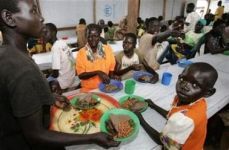South Sudanese going home deterred by weak services
June 24, 2007 (KHARTOUM) — A lack of infrastructure in south Sudan, which is emerging from two decades of war, is hindering the return of some 2 million southerners taking refuge in Khartoum, the International Organisation for Migration said.
 The war between successive governments in Khartoum and the Christian and animist southern rebels killed more than 2 million people, displaced twice as many and devastated the region before a 2005 peace deal.
The war between successive governments in Khartoum and the Christian and animist southern rebels killed more than 2 million people, displaced twice as many and devastated the region before a 2005 peace deal.
Landmines and other unexploded ordnance are delaying a return to farm lands, grass-thatched homes have long disappeared and armed groups, like the Ugandan Lord’s Resistance Army, continue to terrorise civilians.
“I think that when you look at Juba (capital of South Sudan) and I guess the country beyond Juba which is even poorer, you see that there’s a lot of work that needs to be done,” IOM chief Brunson McKinley said after a six-day visit to Sudan.
“Of course when you play that back into the experience of the displaced persons or the refugees, you have to say that it is really the ones who are the most courageous who are going back now and you can understand why others are waiting until things get a little bit better,” McKinley told Reuters late on Saturday.
IOM has helped thousands of southerners return home from slums around Khartoum and McKinley saw some 500 southerners returning by barge to the south.
The organisation hopes to help more than 60,000 displaced southerners return this year, but the majority find the prospect of starting from scratch daunting.
“People have to be able to support themselves and their families and if they know that there is very little awaiting them on the other end, I think that has to be a disincentive, especially if they have managed to establish themselves in a satisfactory fashion in the place in which they are temporarily residing,” McKinley said.
The north-south peace deal gave the semi-autonomous government of southern Sudan a 50 percent share of oil revenues from wells in the south, but the government says that is not enough to meet the region’s enormous development needs.
Following the agreement, donors pledged $4.5 billion to Sudan, some of it earmarked for the south to help rebuild its devastated infrastructure and create a peace dividend, but according to the government, only a fraction of that money has been delivered.
“I think that as the south develops., gradually people will say alright, now it’s good enough, I’ll go back and help to build it better,” the IOM director general said.
(Reuters)
